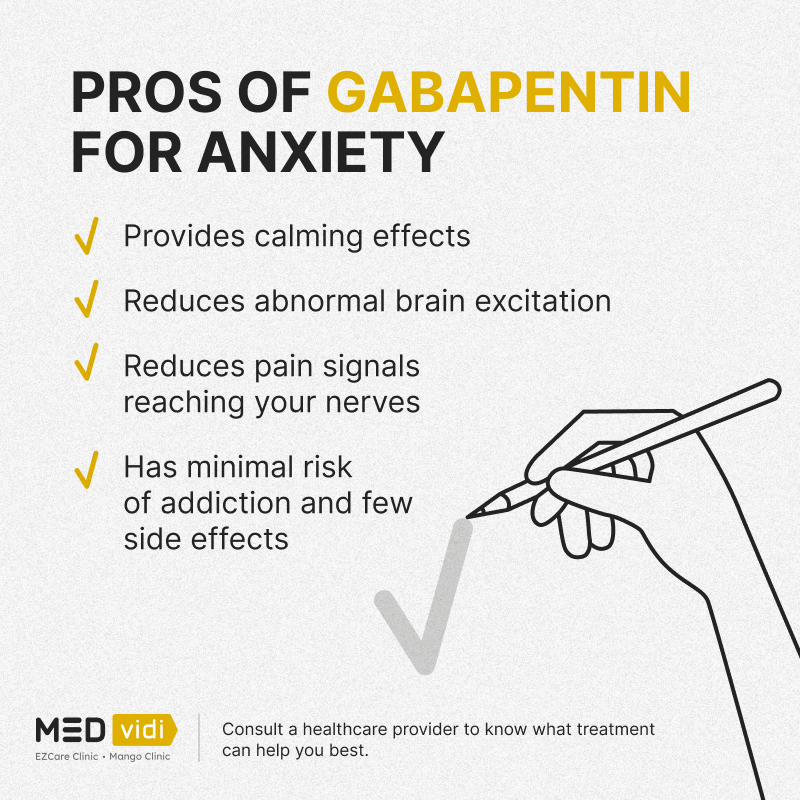Different medications and therapies can help treat anxiety but it may take time to choose the most effective one. The right choice depends on many factors, including symptom severity and individual health differences. When the most common medicines like Xanax or Lexapro seem to be ineffective for a patient, a healthcare provider may recommend less commonly prescribed medications, such as gabapentin (Neurontin). Below, let’s explore its main features, side effects, and benefits.
Ready to conquer anxiety? Click for expert guidance.
About Gabapentin
Gabapentin (Neurontin) is a medication for treating neuralgias, seizures, and some other neurological conditions. While it is not FDA-approved for anxiety, and there is limited data on the efficacy of this medicine for generalized anxiety disorder, it can be prescribed off-label. Gabapentin impacts mood and cognition by controlling the release of gamma-aminobutyric acid (GABA) in the brain, which results in calming effects.
Gabapentin Uses
Gabapentin is an anticonvulsant medication aimed at retarding nerve impulses in the central nervous system that allows using it for different conditions. FDA-approved uses include persistent nerve pain (
Off-label uses include
How Does Gabapentin Work?
Gabapentin works by reducing abnormal brain excitation. It imitates the physiological effects of gamma-aminobutyric acid, being a synthetic counterpart for this neurotransmitter. It alters transferring signals between nerve cells, which can help calm the mind and lessen pain signals reaching your nerves. This evidence makes gabapentin potentially helpful for different types of anxiety disorders.
How Long Does Gabapentin Take to Work for Anxiety
According to the label of Neurontin (gabapentin), its speed of action depends on several factors. First, it depends on the formulation: maximal concentration of immediate-release gabapentin is reached within 1-5 hours while for extended-release medication this period is 3-12 hours. In addition, fatty meals can affect the absorption of extended-release tablets.
Gabapentin Use for Anxiety
If your doctor prescribes gabapentin to treat anxiety, you should take it exactly as directed. Typically, you will begin with a low dose and gradually increase it according to your response to it. Additionally, this provides your body time to adjust to the medication.
Gabapentin is available as a pill, capsule, or oral solution, but for anxiety, your doctor will probably recommend tablets. With or without food, it is typically taken with a full glass of water. Moreover, it is not recommended to take
Connect with a healthcare provider at MEDvidi to receive personalized treatment for anxiety.

Benefits of Gabapentin for Anxiety
Gabapentin helps with anxiety in the following ways:
- It alleviates anxiety symptoms.
- It provides dual relief for those with co-occurring neuropathic pain.
- There is minimal risk of addiction to this medication.
- Few side effects.
Side Effects of Gabapentin
When taking anxiety medication gabapentin, side effects are possible, just like with other medicines. The primary side effects are:
- Dizziness
- Fatigue
- Agitation
- Change in libido
- Tremors
- Unsteadiness
- Involuntary eye movement
- Blurred vision
Some of these side effects might go away with continuous usage, but if they persist or become severe, speak with your physician immediately.
Gabapentin Dosage for Anxiety
The correct dosage of prescribed gabapentin for anxiety is defined by several factors, including your condition and your doctor’s advice. Generally, it’s given in smaller amounts than for treating seizures. The usual dosage range is 100 mg to 300 mg per day. However, speaking with a medical expert who can offer personalized advice and modify the dosage in light of your requirements and medication reaction is crucial.
Gabapentin Alternatives
Since gabapentin is not the first choice for treating anxiety, there are various reasons healthcare professionals seek alternatives to this medication. These include patient response, side effects, and the specific type of anxiety disorder. Exploring all available options is essential to determine the most effective and tolerable treatment. Below is a detailed explanation of possible alternatives used to treat anxiety, including both SSRI and SNRI substitutes.
Selective Serotonin Reuptake Inhibitors (SSRIs)
The main focus of SSRIs is to target serotonin, a neurotransmitter pivotal in mood control. They increase the serotonin available in the brain by inhibiting its reuptake. These medications are frequently the first-line treatment for panic disorder, social anxiety, and generalized anxiety disorder. They can aid in reducing stress, fear, and anxiety-related symptoms.
SSRIs are generally well-tolerated and less likely to have adverse effects than some other medications. They can also be prescribed for long-term use. Examples include
- Fluoxetine (Prozac)
- Sertraline (Zoloft)
- Escitalopram (Lexapro)
Serotonin-norepinephrine Reuptake Inhibitors (SNRIs)
SNRIs affect both serotonin and norepinephrine levels in the brain. Norepinephrine is another neurotransmitter associated with stress and mood. SNRIs have many uses and are frequently given for depressive and anxiety disorders. Targeting multiple neurotransmitters, they can not only assist in alleviating symptoms of anxiety but also provide an energizing boost, contributing to more comprehensive relief. In contrast to SSRIs, they could have more side effects. Examples include venlafaxine (Effexor) and duloxetine (Cymbalta).
In conclusion
While primarily prescribed for seizures and neuropathic pain, gabapentin may be a promising option for those seeking relief from anxiety. To know if you can take gabapentin for anxiety and benefit from it, consult a healthcare professional for personalized guidance.
Frequently Asked Questions
Is gabapentin as good as Xanax for anxiety?
Xanax, which is a benzodiazepine, provides relief but carries a higher risk of dependence and withdrawal. Gabapentin, on the other hand, decreases the chance of becoming addicted. However, these medications belong to different drug types and have different features, so the choice depends on a specific situation and should be based on professional evaluation and recommendations.
What types of anxiety does gabapentin treat?
A doctor may prescribe gabapentin for generalized anxiety disorder (GAD), social anxiety disorder, panic attacks, and certain phobias. Nevertheless, only a healthcare professional can ascertain the appropriateness of gabapentin for your particular anxiety profile.
Can I take gabapentin occasionally for anxiety?
Gabapentin is often given for ongoing use rather than as an occasional or situational anxiety treatment. To keep blood levels stable, consistent dosing may be necessary. However, based on your circumstances, your doctor can advise you on the best way to utilize gabapentin.
Will gabapentin stop an anxiety attack?
Gabapentin may not stop acute anxiety attacks as it is typically not advised to provide immediate relief from an anxiety episode. Benzodiazepines and other short-acting drugs are frequently utilized to alleviate symptoms during anxiety attacks. Gabapentin can be suitable for the long-term treatment of anxiety symptoms.













